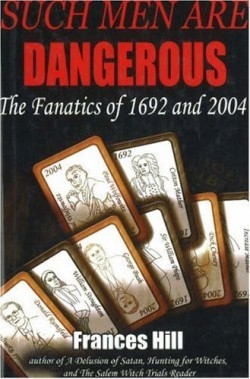
Such Men are Dangerous
The Fanatics of 1692 and 2004
When Frances Hill looks at the Bush administration’s response to the terrorist attacks of 2001, she sees striking parallels to the witch hysteria of 1692. In both instances simple-minded religious and nationalistic fervor predominated over calm, nuanced thinking, allowing powerful ideologues to take control. The author of “Hunting for Witches,” and “The Salem Witch Trials Reader,” Hill makes a provocative, if not entirely convincing case.
As Hill acknowledges, witches and terrorists are, of course, profoundly dissimilar: witches are imaginary and powerless, terrorists are real and inflict terrible harm. Her point is not the similarity of the precipitating events, but the ways the authorities reacted.
Methodologically, Hill presents two parallel histories, devoting more space to the events of 1692 than 2001. The witch hysteria and trials is Hill’s area of expertise, and there may be a need to get readers up to speed; but she provides more information than is necessary. As a consequence, the background material on the Bush administration suffers, at times reading like boilerplate.
The structural underpinning of Hill’s comparison is to pair Bush people with 1692 figures: Paul Wolfowitz with Cotton Mather, Donald Rumsfeld with Deputy Governor William Stoughton, George W. Bush with Governor William Phips. Rumsfeld and Stoughton are described as being cut from the same cloth: ideologically rigid, lacking in humanity and mercy, self-seeking, hypocritical.
Wolfowitz, like Mather, is portrayed as slippery and self-serving, driven by an ideological imperative for which he tries to find rational arguments. Bush and Phips are viewed as intellectually challenged but politically savvy. Despite some tenuous casting, it’s quite entertaining and would make for an amusing parlor game, if it all weren’t so serious.
Hill compares the incarceration of “enemy combatants” at Guantanamo Bay to the witch trials, and says the greatest similarity between the two historical eras is the gross abuse of civil liberties. In both cases there was defiance of law and convention in an effort to obtain confessions and accusations.
Hill posits that America at the beginning of the twenty-first century, with its poverty, lack of health care, overflowing prisons, and random executions, is a place of great savagery, comparable to Massachusetts at the end of the seventeenth century. According to Hill, the people running the country in 2004 are as self-righteous and inhumane as the Puritan leaders of 1692. That will be welcome reading to a segment of the American public and dismissed out of hand by the rest.
Reviewed by
Rob Mitchell
Disclosure: This article is not an endorsement, but a review. The publisher of this book provided free copies of the book to have their book reviewed by a professional reviewer. No fee was paid by the publisher for this review. Foreword Reviews only recommends books that we love. Foreword Magazine, Inc. is disclosing this in accordance with the Federal Trade Commission’s 16 CFR, Part 255.
